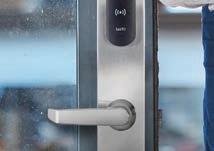


A guide





A guide

By Andrew Snook
Obtaining a post-graduate education is not a simple process.
It takes years of dedication and a significant financial investment.
The schools offering these degrees often argue that they can improve students’ opportunities for moving ahead in their careers, particularly in the case of a Master of
Business Administration (MBA). But has this been the case for professionals in the security industry?
Canadian Security spoke with three industry experts with MBAs to understand how effective post-graduate degrees have been for their careers.
Scott Young, national vice-president of se-
“I just knew I wanted to move up within the organization and be a leader and run a business.”
- Scott Young, GardaWorld
curity systems and technology at GardaWorld, is a perfect example of a go-getter who has focused on growing internally within his organization.
Young has worked for GardaWorld for more than 18 years, starting out as an account manager in 2006 at the company’s Edmonton office. From there he transitioned to a sales role in 2009, then moved to Calgary in 2011 to focus on business development for Alberta. That was when the idea of pursuing a post-graduate degree resonated with him.
“On the sales side, I’m listening to customers all the time, and I got to work with some great clients that I learned a lot from in Calgary. What they were looking for in their RFP (request for proposal) responses was professionalization in each of the func-
tions of a guarding business,” Young says.
While his desire to continue moving up the corporate ladder at GardaWorld was strong, Young wasn’t entirely certain which direction he should take to try and explore more opportunities. Fortunately, he had a good mentor at the time.
“I didn’t really have an end goal in mind, I just knew I wanted to move up within the organization and be a leader and run a business. And so, it was our president at the time, Marc-André Aubé, who said, ‘You’re not going to get to the top without a master’s degree,’” Young recalls. “It was his encouragement, I would say, that really pushed me into it, and then also hearing from customers that that professionalization was important.”
Young enrolled in a part-time MBA at Athabasca University in 2013, so he could continue his career at GardaWorld. During his studies, he moved again to Vancouver in 2014, this time to focus on business development for all of Western Canada.
“There’s the expression, ‘Are you in the security business or the business of security?’ I’ve always kind of thought of myself in the business of security, and that’s what excited me — new sales and revenue growth, growing the business, and leading a team and seeing others grow, that worked for me. All of those factors came together in pursuing an MBA,” he says.
In 2022, Young moved over to the technology side of the company, taking on the role of national vice-president of security systems and technology at GardaWorld, which includes residential smart home security, commercial integration, remote video monitoring, and the mobile surveillance unit business. The skills Young picked up through his MBA have been extremely advantageous for his career growth.
“There are theories and concepts that you’re going to learn about — accounting, finance and operations management and strategy — that you just can’t really pick up naturally, or it’ll take your entire career to learn these things,” he says.
“Be it a certification, or something longer, like a graduate degree… I think you learn discipline.”
— Michael Brzozowski, ASIS International
“The MBA is a way to learn those really quickly, and that’s going to apply to any business, any industry that you’re in.”
For Michael Brzozowski, a career security professional and frequent contributor to the ASIS International organization, obtaining his MBA was a natural progression in his upskilling journey. His ASIS credentials include serving on the Professional Certification Board, and a stint as co-chair of the ASIS Young Professionals group.
Prior to going to school for his post-graduate degree, Brzozowski had already completed a variety of ASIS certifications, and spent time in Philadelphia at The Wharton School for an executive development program in 2018, which focused entirely on business. Coming away from that week in Philadelphia, Brzozowski thought it would be beneficial to understand more about how the C-suite thinks, and how they approach and solve problems.
“The professors at Wharton, none of them were security people,” he says. “The professors that came and t alked to us were [speaking about] negotiations or global trends… I said, in my head, I want to speak like they speak, because the businesspeople that make the decisions, that’s the language that they communicate.”
Starting in 2020, Brzozowski studied his MBA parttime at the University of Fredericton while continuing to work in the security sector, looking at it as a passion project he could complete by taking one course at a time. He completed his MBA in 2024.
Whether someone is studying for a certification or a graduate degree, completing your studies showcases an important skill, Brzozowski says.
“Be it a certification, which is shorter-term but very concentrated, or something longer, like a graduate degree… I think you learn discipline,” he says. “I think what you’re proving to your classmates, to your professors, to your employer, your future employers, is that I committed to something and I finished it, because it’s not easy.”
For Tanisha Singh, IT audit portfolio manager for Canadian Tire Corp., the COVID-19 pandemic created an opportunity for her to upskill right out of completing her Bachelor of Arts at the University of Waterloo in 2020.
With all sorts of uncertainty affecting the job market, Singh decided that she would continue her education with post-graduate studies and enrolled at the Lazaridis School of Business & Economics at Wilfrid Laurier University to obtain an MBA.

“I just wanted to upskill to better position myself for opportunities,” she says. “At that point in time, I didn’t really have a specific direction of where I wanted to go. The beauty of an MBA is that it will upskill you in pretty much any area. I had the opportunity of doing accounting or going into finance — there were so many different doors I had opened up with it.”
From 2020 to 2022, Singh completed her MBA while working a variety of co-op placements within the security industry. After graduating she took on the role of manager of cybersecurity awareness and training at Loblaw Companies Ltd., before moving to Canadian Tire in 2025 and transitioning into an IT audit role.
Singh says the knowledge she gained from her MBA has already paid off early into her career, especially enhancing her communication skills.
“Before my current role, I was in a cyber role, and a lot of that role required me to learn the technical information and then present it to a non-technical audience. The MBA helps with that because there’s a huge focus on your business skill set, but also how you communicate to different stakeholders,” she says. “A lot of the MBA is based on presentations, so you really have to know how to communicate well, both written and verbal.”
Another advantage the MBA has given Singh is gaining a stronger understanding of business processes. She says people in the industry sometimes are too focused on the
technical aspects of their roles and may not understand the broader business goals. “But coming in with that perspective, you understand the organization’s goals — this is their strategy, this is the path that they want to go down, now where does cyber fit into that?” she says.
Another advantage of pursuing an MBA is interacting with professionals from a wide variety of industries.
“Your classmates are all industry professionals that are working in their respective spaces. Some of the classmates I had were from telecom and government, transportation and logistics, and every other possible industry you can think of,” Young says. “We were all learning the same concepts on a weekly basis and then applying it to our businesses. So, the networking piece was a big advantage.”
Brzozowski was the only security professional in his classes, and found the opportunity to work with people from a wide variety of sectors incredibly insightful.
“There were a lot of people from municipal government and health care, and it was really interesting to be able to tackle problems together,” he says. “I think the benefit of specifically an MBA for a security person is you are forced to understand how the whole machine works, not just your little sprocket.”
There’s also an element of recognition that comes with the MBA designation in the corporate world.
“When you’re dealing with a counterpart, whether it’s a manufacturer, a supplier, a colleague, or a client, there’s a little bit of credibility that comes when you have that designation behind your name,” Young says. “So, your words carry a little bit more weight than they normally would.”
While building new relationships within the C-suite of potential clients, the MBA designation can be particularly helpful.
“The technology, nowadays, on the systems and integration side, is a lot more exotic when it comes to artificial intelligence and mobile credentials, cloud storage, all of these things the security professional and our customers and clients need,” Young says. “When you’re working with a customer, especially those that have an MBA, it’s a little bit of a mutual understanding. You’re looking at each other in the eye and knowing that you’ve both been through that process and learned those concepts, and you can have more evolved conversations.”
Young adds that the MBA can also end up being the decision maker when applying for promotion.
“If you’re competing for a promotion, the tie probably goes to the person that has the better resumé,” he says. |


Canadian retailers have long struggled with a fundamental contradiction in their security systems. They need robust protection for valuable merchandise and sensitive areas, yet they also require flexible access for the diverse array of people who legitimately need to enter different parts of their facilities throughout any given day. Traditional lock-and-key systems simply cannot handle this complexity, leading many retailers to accept security gaps as an unavoidable cost of doing business.
Advances in electronic access control technology are changing this equation. Systems that combine digital keypad entry with smart credential technology are emerging as practical solutions to problems that have plagued the retail sector for decades.
To appreciate why this technology matters, consider the access control challenges facing a typical big-box retailer. During a single 24-hour period, dozens of different people may need entry to various parts of the store. Full-time employees require broad access during business hours. Part-time staff need more limited access, often to specific areas only. Cleaning crews work overnight in most areas but should be restricted from cash handling zones. Delivery personnel need temporary access to receiving areas. Vendors may require entry to specific product sections for restocking or maintenance.
Traditional approaches force retailers into uncomfortable compromises. Some opt for numerous physical keys, creating management nightmares when keys are lost, stolen, or not returned by departing employees. Others use basic card systems that treat all access equally, failing to provide the granular control that retail operations actually require.
The problem extends beyond simple inconvenience. When theft or damage occurs, retailers often have no way to determine who accessed the affected area. This makes internal investigations difficult and can lead to unfair suspicion falling on innocent employees.
The new generation of access control systems, exemplified by products like Salto’s recently released XS4 One S Keypad, takes a fundamentally different approach to these challenges. Instead of relying on a single access method, these systems integrate multiple credential technologies into one device.
The core innovation lies in what the industry calls “multicredential authentication.” A single door reader can accept PIN codes entered on a backlit keypad, RFID cards or key fobs, and even smartphone-based digital keys using Bluetooth or NFC technology. This flexibility allows retailers to assign different access methods to different types of users based on their specific needs and security requirements.
The systems operate through centralized software that lets managers program exactly which credentials work on which doors and during what time periods. A seasonal employee might receive a PIN code that only functions during their scheduled shifts and only opens doors to the stockroom and employee break room. A vendor might get an RFID card programmed to work only in the receiving area and only on specific delivery days.
Perhaps most importantly, these systems create detailed audit trails showing exactly who accessed each door and when. This data proves invaluable both for security investigations and for understanding operational patterns.
Early adopters in the Canadian retail sector are finding practical applications that go beyond simple access control. One approach involves creating security zones within larger retail spaces. General stockroom areas might be accessible to most staff using basic PIN codes, while high-value storage areas require both a PIN and an RFID card for entry.
Cash handling areas present another common application. The systems can automatically restrict access to these sensitive zones outside of business hours or require manager approval for any after-hours entry. Some retailers are implementing time-based restrictions that align access permissions with actual business needs.
Employee areas offer opportunities for balancing security with convenience. Break rooms and administrative offices can use shared PIN codes among trusted staff while maintaining individual accountability through managers’ smartphone-based access for oversight purposes.
From a technical standpoint, these systems offer advantages that make implementation more feasible than previous generations of access control technology. Battery power eliminates the need for electrical wiring, allowing retrofitting of existing doors without major construction projects. Compatibility with standard door hardware means most installations can work with existing locks and door frames.
For multi-location retailers, cloud-based management platforms enable centralized control across entire chains. When an employee transfers between locations, their access rights can be updated instantly rather than requiring new physical credentials.
The technology represents a significant shift from treating security as a necessary burden toward viewing access control as a tool that can significantly improve operational efficiency. As implementation costs continue to decline and the technology becomes more widely available, Canadian retailers are likely to see these systems become standard rather than exceptional in the coming years.
Salto is helping retail businesses simplify their access management workflow to increase productivity, security, and operational efficiency while reducing costs and optimizing business processes.
saltosystems.ca

























Surveillance systems were once limited to reviewing incidents after they occurred. Now, AI-powered cameras work in real time, delivering predictive insights and analytics that enhance situational awareness of the total retail environment.
Retailers are using AI and onboard camera analytics to conduct people counting, queue monitoring, and dwell time analytics to fine-tune everything from staffing to layout. With heat mapping, store managers can visualize which areas of a store attract the most attention and adjust product placement accordingly.
For many organizations, video surveillance still sits squarely within the domain of loss prevention but that’s changing rapidly, presenting a unique opportunity for loss prevention professionals to lead the conversation at the executive level. By reframing surveillance as a source of operational intelligence, operators can secure cross-functional support, unlock greater organizational impact, and position themselves as strategic partners driving organizational efficiency.
Security tool? Operational engine? Both?
AI-powered surveillance has moved beyond simply recording incidents or monitoring for theft. It now can help retailers understand customer behavior, optimize staff deployment, identify merchandising opportunities, and drive better overall store performance.
Consumer expectations are higher than ever, and retail success depends on both experience and efficiency. AI-driven video helps retailers strike that balance, with just a few examples including:
• Improved labor management.
• Optimized store layouts.
• Faster response to operational issues.
• Consistency across locations.
• Reduced inventory handling errors.
Every investment has to prove its value. AI-enabled surveillance offers multi-departmental ROI, and forward-thinking retailers are moving surveillance decisions beyond the loss prevention silo and bringing operations leaders into conversations.

By deploying video surveillance as a business intelligence tool and a platform for optimizing performance, retail organizations can unlock greater value from their existing infrastructure. Cameras that were once seen only as a cost center are now generating insights that impact everything from how long customers wait in line to which endcap drives more engagement.
Every retail operation is different, with varying footprints, customer bases, geographical locations and, of course, different budgets and surveillance requirement. That’s why it’s important to partner with the right technology provider. Hanwha Vision delivers advanced solutions tailored to meet the unique surveillance needs of each retailer.
By combining industry knowledge with Hanwha Vision’s powerful, adaptable technologies, we can work directly with retailers to develop practical, effective security solutions that are built to solve the challenges retailers face every day. The future of video surveillance in retail is about more than just seeing, it’s about understanding. With the right technology and expertise, retailers can turn that understanding into smarter, faster decisions across their entire business.

Retail stores face unique security threats and surveillance challenges. They need new types of surveillance technologies combining 24/7 monitoring with Artificial Intelligence, cloudbased capabilities, and specialized analytics.
Hanwha Vision’s intelligent surveillance solutions can make the shopping experience smarter and safer, protecting employees, customers, and profits.


According to a Globe and Mail article published in January, the Retail Council of Canada estimates that Canadian retailers lost more than $9B to theft in 2024, a dramatic increase from the $5B annual losses reported in 2018.
On top of shoplifting incidents, retailers must now deal with organized retail crime, seeing a rise in larger-scale robberies. The convenience of digital platforms where users can buy and sell products has made peddling stolen merchandise much easier than it used to be. In addition to warding off casual shoplifters, store owners must also protect their assets as well as their employees from organized criminals, often acting in gangs, and at times resorting to violence.
Technology and Know-How Add Up to Effective Protection and Loss Prevention
To counter organized retail crime, reduce costly losses due to shoplifting, and prevent the resale of stolen items on the black market or on the Internet, more store owners are now opting for a hybrid security solution combining the technological capabilities of AI and the knowledge of qualified floor detectives.
“Retailers increasingly use artificial intelligence, and our monitoring systems provide exactly the type of AI features needed to prevent theft and cut losses,” mentioned Daniel Zalzal, Security Systems Senior Sales Manager at GardaWorld Security.
The right blend of good old human experience and AI advanced features presents many advantages when it comes to ensuring store security and limiting losses. Key benefits include AI instore profiling and storewide detection of shoplifting attempts, real-time alerts allowing for swift response time, and a sharp decrease in the number of thefts.
GardaWorld Security’s video surveillance cameras give floor detectives control of the entire shop, allowing them to go beyond human capacity by keeping an eye on every nook and cranny.
Technologically advanced cameras with integrated AI-driven analytics recognize the suspicious behavior that usually precedes shoplifting, sending a warning signal to the store detective. With this important information, the undercover security guard can act swiftly to catch shoplifters red-handed.
When it comes to prevention, trained security personnel in uniform act as both visible deterrents for criminals and as safety providers for clients and staff, whereas plainclothes security guards stay ready to catch thieves in the act.
To counter rising losses due to theft, retailers are adopting newer and more advanced security options like high-definition video surveillance, AI-driven analytics, cutting-edge exit security gates, and self-checkouts that automatically detect irregularities. However, on-site qualified store detectives, with their skilled knowledge and ability to react quickly, are a necessary complement to this top-notch technology.
“GardaWorld Security also provides training for store employees who oversee self-checkout in order to help them counter shoplifting by recognizing certain cues, knowing what to look for and where to position themselves, or understanding how to address problematic clients,” added Marc-André Plaisance, Loss Prevention Manager at GardaWorld Security.
What makes GardaWorld Security stand out from the competition is our ability to offer a whole range of security solutions adapted to your store’s requirements. From video surveillance and risk analysis to consulting and theft prevention, we provide turnkey solutions tailored to your needs.
Contact one of our experts today to protect your retail space and prevent losses.
At GardaWorld Security, we understand the unique challenges faced by retailers in Canada. As a trusted partner for numerous retail businesses, we offer tailored security solutions that integrate advanced technology and expert security services to protect your assets and customers.
Security guards
Loss prevention services
Consulting and investigations
AI video surveillance
Mobile patrols
Remote monitoring
Threat assessment and risk analysis

Partner with GardaWorld Security to enhance the safety and security of your retail business.

This book provides experience-based, proven methods for preventing and resolving the challenges faced by today’s hospitality security staff and leadership.
The lodging component of a hospitality environment creates challenges to the security professional by its complex set of assets and amenities—especially when combined with gaming environments. Whether the reader is establishing, or improving, a professional, proactive proprietary security force, or the manager of a boutique hotel, the practical methods described herein are applicable to everyone.
$119.50 | Item #0367480189

Developing a Security Training Program focuses on how to establish a comprehensive training program for a security department from the ground up. This book highlights formal curriculum development, consistent and continual training, and the organizational benefits including how such security training will be a valueadd. Developing a Security Training Program provides the blueprint and tools for professionals to provide ongoing, targeted, and comprehensive security training at a low, budget-friendly cost.
$100.80 | Item #1032274034
